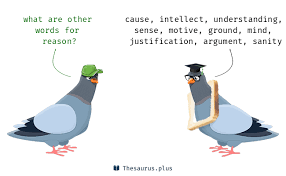
The word reason is one of the most versatile and frequently used terms in the English language. From philosophy and logic to everyday conversations, it carries meanings ranging from “explanation” to “rationality.” However, language thrives on variety, and that is where synonyms come into play. A synonym not only enriches expression but also provides nuance, precision, and creativity in communication.
Understanding the Core Meaning of “Reason”
Before diving into synonyms, it’s important to understand the essence of the word itself. At its core, reason can mean:
- Cause or explanation – “The reason for his absence was illness.”
- Rationality or logic – “Humans are beings of reason.”
- Justification – “She had every reason to be upset.”
- Purpose or intention – “There’s a reason behind every action.”
Because of this wide scope, synonyms for reason differ depending on the context in which the word is used.
Common Synonyms of Reason (With Contextual Meanings)
1. Cause
Often interchangeable with reason when referring to why something happens.
- Example: “The cause of the accident is under investigation.”
2. Explanation
Useful when providing clarity or justification.
- Example: “She gave a detailed explanation for her decision.”
3. Basis
Implies a foundation or support for an argument or action.
- Example: “His claims had no basis in fact.”
4. Justification
Strongly tied to the idea of defending an action.
- Example: “There is no justification for cruelty.”
5. Motive
Connected more with intention, especially in psychology or crime-related contexts.
- Example: “The detectives searched for a motive.”
6. Logic
Refers specifically to rational thinking.
- Example: “The argument lacked logic.”
7. Rationale
Formal synonym used in academic or professional discussions.
- Example: “The rationale behind the policy was sound.”
8. Grounds
Commonly used in law and formal debates.
- Example: “He was dismissed on the grounds of misconduct.”
9. Sense
Highlights reasoning as rational judgment.
- Example: “That decision makes no sense.”
10. Understanding
Sometimes used in the sense of reasoning ability.
- Example: “Her understanding of the issue is profound.”
Synonyms of Reason by Category
To make synonym usage clearer, let’s categorize them:
- For Cause/Explanation: cause, explanation, basis, grounds.
- For Logic/Rationality: logic, sense, reasoning, intellect.
- For Justification/Defense: justification, rationale, excuse, warrant.
- For Intention/Motivation: motive, aim, purpose, objective.
This categorization helps in choosing the right synonym depending on tone, setting, and context.
The Role of Reason in Language and Thought
The word reason doesn’t just describe explanations—it also represents humanity’s ability to think logically and critically. Philosophers from Aristotle to Kant have emphasized reason as the guiding principle that distinguishes humans from animals.
Using synonyms of reason allows writers, speakers, and thinkers to sharpen their ideas, avoid repetition, and adapt to different contexts, whether casual, academic, or artistic.
When to Use Reason vs. Its Synonyms
Choosing the right synonym requires sensitivity to nuance:
- “Reason” is general and versatile.
- “Cause” emphasizes why something occurred.
- “Justification” emphasizes defending an action.
- “Logic” emphasizes rational structure.
- “Motive” emphasizes personal or hidden intent.
Example comparison:
- “The reason he left was unclear.”
- “The cause of his departure was unclear.”
- “The motive behind his departure was unclear.”
Though similar, each conveys a slightly different shade of meaning.
Rhyme Without Reason: Language Beyond Logic
The phrase “rhyme without reason” refers to expressions, actions, or ideas that seem playful, whimsical, or even illogical. It emphasizes creativity without the strict boundaries of rationality.
For example:
- Children’s rhymes often follow this style.
- Artists and poets sometimes use it to break away from rigid structures.
The concept balances perfectly with our discussion of synonyms for reason—while synonyms provide precision, “rhyme without reason” celebrates freedom and imagination.
Rhyme Without Reason Ideas: Creative Examples
If you’re looking to explore language creatively, here are some fun “rhyme without reason ideas”:
- Random Word Pairing – Create rhymes with unrelated words:
- “Moon spoon raccoon balloon.”
- Playful Phrases – Use rhymes in nonsense poetry:
- “Dizzy Lizzy spins so busy.”
- Character Names – Writers can invent quirky character names:
- “Sammy Slammy, the candy cranny.”
- Party Themes – Popular in costume parties where guests dress up as rhyming pairs with no logical link:
- “Nun and Bun,” “Cop and Mop,” “Cat and Bat.”
- Songwriting Inspiration – Many musicians use rhyme without reason to create catchy hooks.
These ideas highlight how language doesn’t always have to be logical; sometimes, creativity thrives on breaking reason’s rules.
Reason vs. Creativity: Striking the Balance
While synonyms of reason stress clarity, structure, and rationality, concepts like rhyme without reason remind us that language also serves play, beauty, and imagination. Striking the balance between reason and creativity is the hallmark of powerful communication.
For example:
- In academic writing, synonyms like rationale or basis add sophistication.
- In poetry or advertising, “rhyme without reason” sparks attention and memorability.
Why Learning Reason Synonyms Matters
- Improves Vocabulary – Expands language choices.
- Enhances Writing – Avoids repetition and increases clarity.
- Sharpens Communication – Helps convey precise meanings.
- Boosts Creativity – Encourages playful alternatives.
- Strengthens Critical Thinking – Differentiates between cause, motive, and justification.
Practical Applications of Reason Synonyms
- Academic Writing: Replace reason with rationale or basis.
- Legal Contexts: Use grounds or justification.
- Creative Writing: Use motive or purpose.
- Daily Conversation: Swap with cause or explanation.
Conclusion
The richness of the English language lies in its diversity of expression. While reason serves as a powerful word to describe explanations, logic, or purpose, its synonyms—cause, motive, justification, rationale, and more—add depth and precision.
At the same time, the concept of “rhyme without reason” reminds us that not all communication must be bound by strict logic. Sometimes, playful nonsense or whimsical expression has its own charm and cultural significance.
By mastering both the structured world of synonyms and the imaginative realm of “rhyme without reason ideas,” you unlock the full spectrum of language—logical, artistic, and everything in between.






